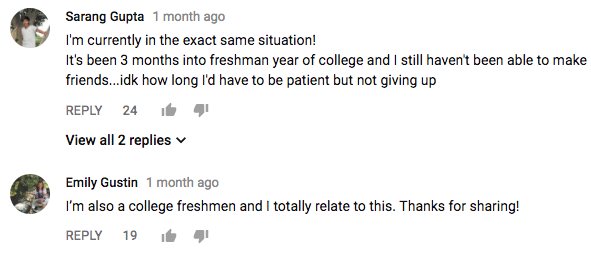What happened?
If you pay attention to higher education news, then you’ve likely heard about Emery Bergmann’s viral video highlighting her lonely college transition at Cornell University. At the time of writing, Emery’s YouTube video has received 214,000+ views in six weeks and has been featured by the Washington Post, Business Insider, Inside Higher Ed as well as the Today show website.
I recently spoke with Emery about the video and her transition at Cornell.
Like many seniors in high school are led to believe, Emery headed to Cornell with the expectation that her college years would be the best of her life. She describes in the video, “I just assumed that once I was at school, I was gonna have a million friends; I was gonna just party all the time”.
So far, it hasn’t quite turned out that way. Emery admitted to me that “campus doesn’t feel like a place to connect” and that college feels like a “separated experience”. With a sense of awareness and candor that persists throughout her video, she confesses, “making friends is hard…you can be surrounded by people, but still feel alone”.
Is Emery alone?
So, is Emery’s situation unique? The short answer – not at all.
I can speak from personal experience and tell you that my years as a student at Monash University (Melbourne, Australia) felt highly transactional – I went to class and I got out of there. I certainly didn’t feel a great sense of university community or belonging, and I don’t think it’s because we didn’t have NCAA athletics or because I wasn’t staying in a dorm.
Loneliness at university is a common phenomenon and can have far-reaching effects on persistence and success at university.
First-year students who have just left home and high school with far more structure often feel lonely and online students commonly complain about a sense of isolation, which isn’t surprising given they’re physically disconnected from peers, faculty and support.
As Jeremy Bauer-Wolf cites in his Inside Higher Ed article, “Bergman captures a problem that student affairs professionals and counselors say is not new among college students”.
The many student comments on Emery’s video further support this.

Ivy league loneliness.
Ok, but is loneliness even that common in the Ivy League?
It could be worse.
Firstly, I would contend that there isn’t something about Cornell or Ivy League students that make them more apt at making friends or involving themselves in their university community. Certainly, I’m not aware of any services or initiatives that make it easier to connect with peers, staff and support at Ivy League universities compared to the average college.
If this is true, and we couple it with the generally held expectation that these students are just meant to excel, it’s quite possible that the experience at an Ivy League university may be even more lonely than less competitive schools.
A confronting and insightful VICE article by a Columbia University student, Zachary Schwartz, speaks to this. Zachary claims, “classmates are your competition, not your friends” at Columbia.
He goes on to say, “everything is a competition”, that “everyone is emotionally drowning under the surface” and that “people sacrifice their mental health” just to get in front of the next student.
I don’t know about you, but that sounds like a pretty scary, solitary experience.
What support is in place?
As touched on above, feeling lonely is not a new thing among college students.
Colleges and universities have student affairs (or similar) divisions, under which sit numerous services. Student services are there to give students the greatest chance of success by supporting them academically and personally.
When speaking with Inside Higher Ed, Kevin Kruger (President of NASPA: Student Affairs Administrators in Higher Education) noted that “campus officials have done ‘quiet work’ on addressing engaging students and ensuring that they take care of their mental well-being”.
He adds “much more now, colleges and universities are training their professors and their staff members to serve as an ear for students and teach them how to direct students to resources like a counseling center.”
Cornell’s response.
This may come as a surprise, but Cornell has made no effort that we know of to connect with Emery to offer support.
I repeatedly asked Emery “has anyone contacted you yet?”, and she said that none of Cornell’s support staff were reaching out.
As someone passionate about enhancing student support at universities and colleges, I found this pretty shocking, so I decided to get in touch with Cornell staff about Emery’s transition and how we might help students like her.
I contacted over 25 Cornell staff asking for 20-30 minutes of their time. I was shuffled onto other departments numerous times and am yet to find a staff member interested in discussing Emery and what we do.
Even more intriguing is that staff from George Washington University have been in touch with Emery, letting her know how much they appreciated the video and that they were going to share it internally.
Given the attention Emery’s video has gotten and the support services that exist at Cornell, it’s baffling that no one has reached out to her – particularly when we consider it costs $70,000 per year for an undergrad degree at Cornell (or as Emery explained, “an iPhone 8 every 2.7 days”).

Takeaways?
Emery’s video caught my attention because it implies that loneliness and struggle can be felt by any student – even the elite ones at Cornell and other Ivy League universities.
To borrow from Matthew Liebermann (Director of the Social Cognitive Neuroscience Lab at UCLA) – we are all wired to connect.
As humans, our brains quite literally crave a sense of belonging in our different ‘communities’ – be it family, friends, work or school.
Because students often have no ‘people’ when starting university, their need for connection and belonging tends to be felt very quickly.
The trick then is to connect students with their university community as soon as possible – and to do so in meaningful, relevant ways.
Some ideas for connecting students:
1. Connect students with their incoming class early on – well before they arrive on campus for orientation week
2. Make it as simple as possible to connect with student services and get support – think live chat rather than students having to schedule appointments
3. Become proactive, rather than reactive – use data (e.g. a YouTube video about a lonely transition!) to trigger contact with a student, rather than requiring them to reach out
4. Use data to help connect students with like-minded peers across the university – just because students live in a dorm, doesn’t mean their new best friend will be their roommate or someone on their floor
5. Implement programs that encourage peer-to-peer support and normalize help-seeking behavior amongst students – this could be particularly valuable at schools like Cornell where the culture is highly competitive
I could go on, but if we can do these kinds of things (particularly early on), I’m positive we can reduce loneliness and show students that they do in fact have a support network around them at college.
If we can be helpful in any way in these areas for your college, please get in touch here.

